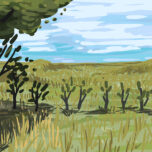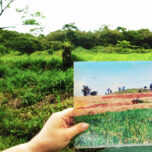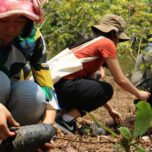October 3, 2023 — Planting trees is one of the best things we can do to not only add beauty to our surroundings but also sequester carbon, support biodiversity and provide numerous other benefits to people and nature alike.
But which trees, where? Getting the answer to that question right plays a big role in the extent to which trees add value to the landscape and its nonhuman and human inhabitants. According to the 10 golden rules for large-scale tree planting, it’s important to choose trees species appropriate for the location in question, plant a variety rather than create a monoculture, make accommodations for a changing environment, and take the needs and interests of local people into consideration.
With tens of thousands of tree species to choose from worldwide, translating those recommendations into a detailed planting plan for a specific location can be a big challenge. But new work by researchers from Kenya, Denmark and the UK is simplifying the task. The international team recently launched an app called GlobalUsefulNativeTrees (GlobUNT) that provides customizable guidance for planning tree plantings to meet multiple benefits.
The researchers created GlobUNT by combining data on some 14,000 tree species and growing conditions in 242 countries and territories with information on how the various species meet 10 use categories: animal food, environmental uses, fuel, gene sources, human food, invertebrate food, materials, medicines, poisons and social uses. Users simply enter data on location, desired benefits and climate, then GlobUNT sifts through the database and returns a recommendation for a specific mix of species that fits the bill.
“Many current tree-planting initiatives for forest landscape restoration fail because they do not sufficiently consider the needs of the local communities who plant and tend them,” the researchers wrote last month in a paper in Nature describing the new resource. “[F]or any country where a project aims to implement tree planting schemes that aspire to maximise native tree biodiversity while addressing local community needs, GlobUNT will be a user-friendly source for practical information.”
Related Posts
Ensia shares solutions-focused stories free of charge through our online magazine and partner media. That means audiences around the world have ready access to stories that can — and do — help them shape a better future. If you value our work, please show your support today.
Yes, I'll support Ensia!




